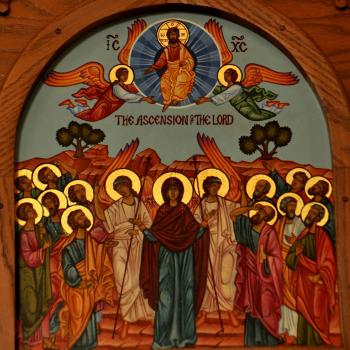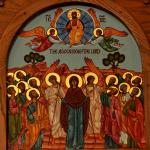Jesus told us that he came to give us abundant life (cf. Jn. 10:10). Thanks to him, the fetters of sin which leave our lives empty and full of despair are able to be taken off, allowing us to share in the bounty of heaven. Sin wounds us, leaving us stranded in a dark, loathsome, existence. Though it is incapable of destroying the goodness of nature, and totally eliminating the beauty which God gave to his creation, sin corrupts that goodness, allowing us to have a limited share of its glory. Thus, while we do experience some of the joys of beauty in life, what we have is, at best, a shadow of what God has to offer to those willing to take in the glory of the kingdom of God. We might find some temporal form of happiness, but before long we will need more. Without the light of grace, we still experience a little of the goodness and beauty which we need to make us happy, but it is not enough; we need more. As Hugh of St Victor explained, so long as we have life, our heart longs for that goodness which can fulfill its desires, and once it realizes it cannot be found within it will go searching for the other which can give it everlasting love:
The life of the heart is love, and for that reason it is utterly impossible for the heart that desires to live to be without love. Consider what follows from this. If, then, the human mind is not able to be without love, it is necessary either that it loves itself or certainly that it loves something else. Because it does not find perfect good in itself, if it loves itself only, its love cannot be happy. Therefore, it is necessary that if it desires to love happily, it should seek something other than itself to love.[1]
Our heart constantly seeks for its beloved. But do we know what it seeks? That which is good and holy, because from the good we find the glory of the good, which is its beauty. For such beauty, when we see and experience it, attracts us to the source of that beauty, filling our heart with desire; this is why we find ourselves falling in love with it. Our hearts, therefore, constantly seek the beautiful and when we find it, we naturally find ourselves attracted to it, wanting to find way to take it into our lives so that we can participate in the glory which we love so much. But, as St. Maximus the Confessor explained, all things share in with goodness and beauty, which is why in all things there is something which pleases us and attracts us to it:
The beautiful is identical with the good, for all things seek the beautiful and good at every opportunity, and there is no being which does not participate in them. They extend to all that is, being what is truly admirable, sought for, desired, pleasing, chosen and loved. [2]
And so, our heart, seeking such beauty, and finding it all around, glorifies in the beauty of creation. But because of sin, it takes in the world and its glory in a limited, and disordered fashion. It loves the world and its transient good, which truly should be respected because it comes from God, more than it deserves, treating it as a greater glory than it is. And so we find ourselves closed off from the higher, absolute beauty and goodness which we need for eternal beatitude. The limited glories found in the created order of the world are mistaken for being all that there is, and when they do not provide for us what our hearts long for most of us, we find ourselves moving away from the innocent joys of youth to cynical despair: our heart longs for more, but the abundance which it needs seems to be non-existent.[3]
Therefore, we tend to find ourselves in love with the glory of the world but find, as we let in that glory and participate in it, that as good as it is, as beautiful as it is, we can and do tire of it. There is goodness and beauty but it falls short of what the heart desires. It receives consolation in and through that goodness and beauty but as it is a derived goodness and beauty and not the fullness of it, the heart grows once again to despair. Is this all there is? The beauty is incomplete, indeed, it is almost lifeless in quality, for only in the light of grace can the derived beauty be filled with life. It is as it were the difference between the dark days of winter and the glory of spring – the glory which we seek is the grace which will take the dark, wintery existence of our life, where things come to a standstill and even seem to slowly wither away, to the glory of spring, where everything is growing anew.

This, the difference between the limited beauty of winter, where it should not be contested that nature still reveals itself as good and holy and beautiful, and not without some limited wonders of its own, with the bounty of spring, was brought out by St. Cyril of Alexandria in his festal sermons, where he saw the fittingness of the resurrection being established in the spring because the spring represented the new life which Jesus came to give us all. Using Isaiah 52:7 with its talk about the beautiful mountains,[4] he explained what occurred on such mountains in winter and what happened on them in spring is a reflection of what Jesus has accomplished in the world. For Jesus takes us from the darkness of winter to the light of spring:
The plants on the mountain and in the park, when winter induces condensation in them and prevents the sap from the roots from coursing upwards abundantly, all but wither and do not bear fruit, suffering as they do from the lack of foliage. But when the season of beauty shows itself, when, that is, springtime laughs and warms everything with the sun’s hot rays, then what has shut opens up, and, with the sap that had been lying deep now having its course free to run everywhere, the twigs, quite drunk on it, throw out the fresh verdure of their leaves and so are crowned at once with their own fruit. Our Jesus Christ has become for us, then, “as a season of beauty upon the mountains.” This too may become clear to us through other passages of sacred Scripture. In the Song of Songs, for instance, the person of the bridegroom is introduced crying out to the Church as to a bride, “Rise up, come, my companion, my fair one, my dove! For behold, the winter is past, the rain is gone, it has departed. The flowers are seen in the land; the time of pruning has arrived.”[5]
This is what the Church needs to continue to spread to the world today, this message of the beauty and goodness which God has given to us in and through the work of Jesus Christ. He is the light of the world, and now he brings to us the new light which is like the light of spring. [6] That our hearts properly seek out such beauty, and find traces of it in the world, must be recognized as a foundation and not a problem for our evangelism. What people have without grace has traces of the kingdom of heaven and its glory remaining within, but those traces are found, as it were, in a twilight kingdom, a dark work which does not possess the fullness of grace, and so gives out the limited, decaying beauty of winter. It is a glory which is to be recognized, a glory which shows the darkness of sin does not and cannot wipe out the inherent goodness of creation, but a glory which needs grace which is like the new life found in spring in order to lift it up and allow it to share in the glory which was meant for it.
This grace which can lift us up, taking us from the transient glory we normally experience to eternal glory, must be the foundation of our message. We can attract people to faith in and through the beauty of the Lord, because his beauty when seen is what stirs up hearts and makes them open to the grace which they need in order to have an abundant life. We must not focus on and keep showing the defects which cover the world in the darkness of winter; focusing on such negativity is not attractive. Indeed, it is likely to have a reverse effect than we wish, because if all people know is such limited glory and we criticize it exceedingly without recognizing the good within it, then they will likely agree with the negativity but have nowhere to go with it, and so will follow such negativity all the way to where it leads, to the denial of goodness and beauty, and therefore, to the denial of being. When Christians focus on the negativity of sin instead of the beauty of the Lord, they leady people away from the kingdom of God: woe is it to those who would do so.
We are not to think of the negativity, but rather of all that is good and holy and beautiful: “Finally, brethren, whatever is true, whatever is honorable, whatever is just, whatever is pure, whatever is lovely, whatever is gracious, if there is any excellence, if there is anything worthy of praise, think about these things” (Philip. 4:8 RSV). If our focus is on God, we will see God in all things, we will see the reflected glory of God in all things, and we will point to that goodness and glory as a way to lift all things up. And this is how and why we are sent into the world, to show the beauty of God, and to be bearers of the grace which perfects the goodness already found in nature. If we cannot see such beauty and glory and appreciate it, the problem lies not with the world but with us, as we clearly have closed ourselves to the light of God which shows forth the beauty of his creation. If all we do is seek to deconstruct the world and tell everyone we encounter how bad off they are because of the darkness of sin, we give them none of the hope they need; is it any wonder, then, they deny what we have to offer? We need to be honest and truthful, but that means not seeing the world entirely darkened and destroyed by sin; we need to see the beauty within and lift it up, so that it can take in the grace which perfects nature, and with it, be filled with the Holy Spirit, the Lord and Give of True Life. Then the glory of God can fill all things and be all in all, as God intended (cf. 1 Cor. 15:28).
[1] Hugh of St Victor, “What Should Truly Be Loved?” trans. Vanessa Butterfield in Victorine Texts in Translation. On Love. ed. Hugh Feiss, OSB. (Hyde Park, NY: New City Press,2012), 179.
[2] St. Maximos the Confessor, “Fifth Century of Various Texts” in The Philokalia: The Complete Text. Volume Two. trans. and ed. By G.E.H. Palmer, Philip Sherrard and Kallistos Ware (London: Faber and Faber, 1990), 180. ¶83.
[3] St. Bonaventure had his soul express this problem by saying: “Lord, now I understand but am ashamed to confess it. The beauty and grace of creatures deceived my eyes and I did not realize it. After all, you are more beauteous than all creatures, to whom you have given but a little drop of your inestimable beauty,” St. Bonaventure, “Soliloquium” in Works of St. Bonaventure X: Writings on the Spiritual Life. intr. and notes by F. Edward Coughlin, O.F.M. ed. Robert J. Karris (Saint Bonaventure, NY: Franciscan Institute Publications, 2006), 236.
[4] “How beautiful upon the mountains are the feet of him who brings good tidings, who publishes peace, who brings good tidings of good, who publishes salvation, who says to Zion, ‘Your God reigns’” (Isa. 52:7 RSV).
[5] St. Cyril of Alexandria, Festal Letters 13- 30. trans. Philip R. Amidon, S.J. (Washington, DC: The Catholic University of America Press, 2013), 5 [Letter 13].
[6] When using such an image we must recognize, as St. Gregory Palamas did, it is useful for us to help us understand the way God works, but we must not misconstrue God by it. “For He is ‘the true light’ (John 1:9), the beauty of divine glory, and He shone forth like the sun – though this image is imperfect since what is uncreated cannot be imagined in creation without some diminution,” St. Gregory Palamas, “The Declaration Of the Holy Mountain in Defense of Those Who Devoutly Practice a Life of Stillness” in in The Philokalia: The Complete Text. Volume Four. trans. and ed. By G.E.H. Palmer, Philip Sherrard, Kallistos Ware, et. al. (London: Faber and Faber, 1995), 422. ¶4.
Stay in touch! Like A Little Bit of Nothing on Facebook:
A Little Bit of Nothing
















